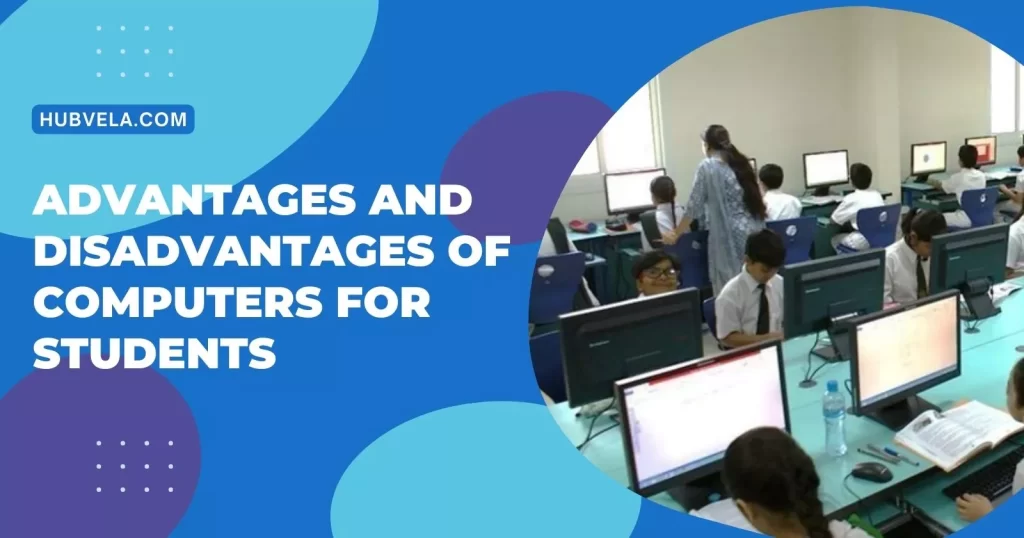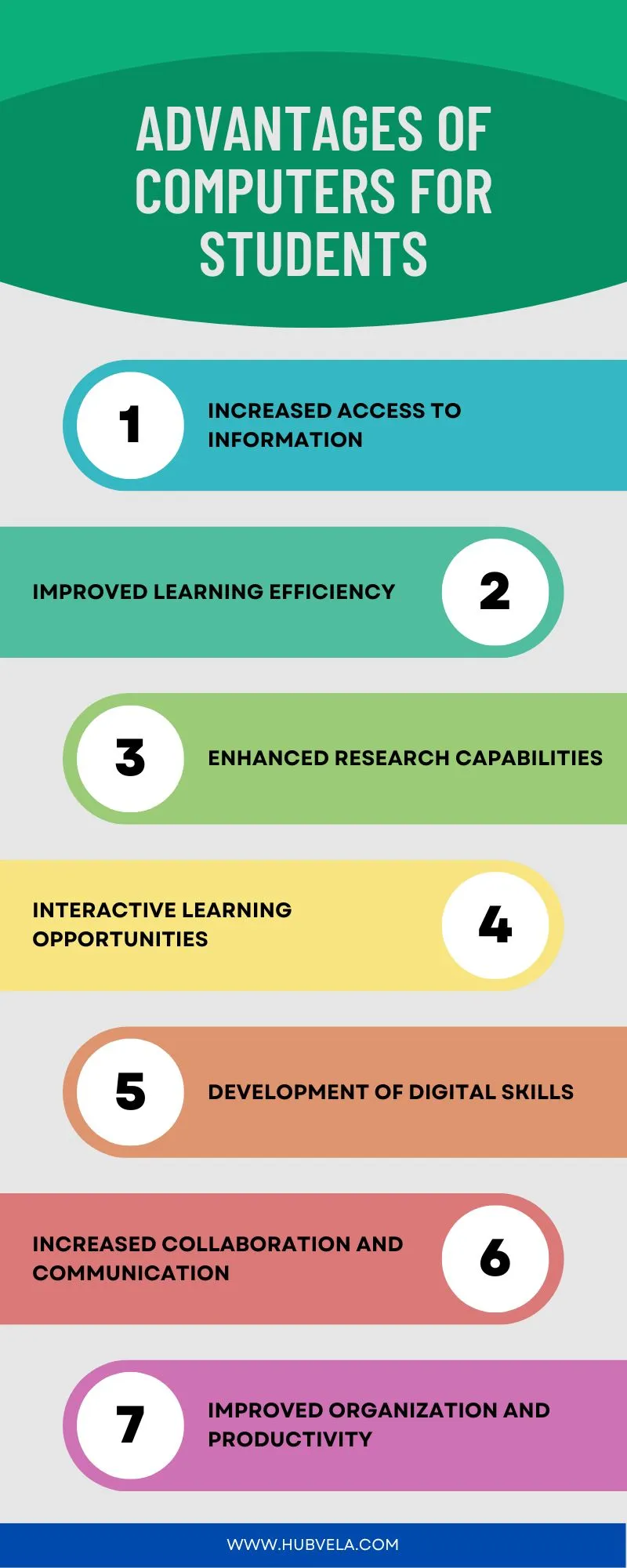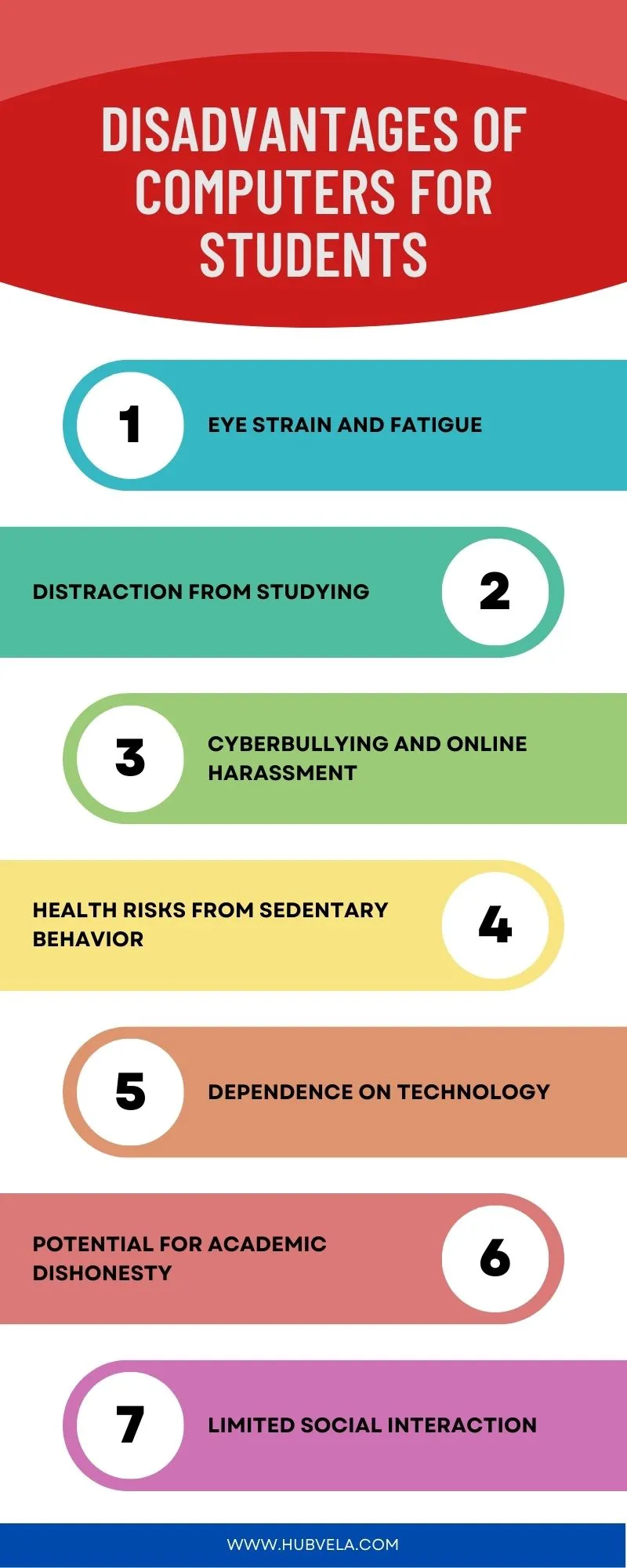Like a double-edged sword, computers offer both advantages and disadvantages.
They can be powerful tools that open up a vast ocean of information, like a treasure chest waiting to be discovered. With computers, you can access information instantly, learn more efficiently, conduct thorough research, and engage in interactive learning experiences.
However, be aware of the potential drawbacks. You may become overly dependent on technology, leading to a lack of critical thinking skills.
Academic dishonesty may also be a concern, and limited social interaction can be a consequence. It’s essential to weigh these pros and cons to navigate the world of computers effectively as a student.
Let’s explore the topic “Advantages and Disadvantages of Computers For Students” in detail.

--Advertisement--
Advantages of Computers For Students
In the digital age, computers have become an integral part of our lives, revolutionizing the way we learn, communicate, and work.
For students, computers offer a plethora of benefits that can enhance their educational journey and equip them with the skills needed to succeed in the modern world. Some of the key advantages of computers for students include:

1. Increased Access to Information
With computers, you have easy access to a wealth of information. The accessibility of information is one of the greatest advantages that computers offer to students. In the past, you may have had to visit a library and spend hours searching through books to find the information you needed. Now, with just a few clicks, you can access a vast amount of knowledge from the comfort of your own home.
However, it’s important to be aware of information overload. It can be easy to get overwhelmed with the sheer amount of information available, so it’s crucial to develop critical thinking skills to evaluate and analyze the information you find.
Additionally, computers can help improve your digital literacy, which is essential for academic performance in today’s digital age.
2. Improved Learning Efficiency
By utilizing computers, you can enhance your learning efficiency and maximize your academic potential. The benefits of technology in education are numerous, and one of the most significant advantages is the learning flexibility it offers.
With computers, you have the freedom to learn at your own pace and in your preferred learning style. The ability to access customized learning materials and resources tailored to your individual needs is another remarkable advantage.
Additionally, computers enable remote learning, allowing you to study from anywhere at any time. This flexibility not only saves time and resources but also promotes self-discipline and independence.
Moreover, computers contribute to increased student engagement through interactive learning platforms, multimedia resources, and educational games. Embracing technology in education undoubtedly improves your learning efficiency and empowers you to excel academically.
3. Enhanced Research Capabilities
To enhance your research capabilities as a student, utilizing computers provides numerous advantages.
Computers enable improved analysis of data, allowing you to analyze large amounts of information quickly and efficiently. With efficient data processing, you can organize and manipulate data in a way that facilitates your research process.
Additionally, computers grant access to a wide range of reliable sources, such as online databases, academic journals, and scholarly articles. These resources enable you to gather accurate and up-to-date information for your research projects.
Moreover, utilizing computers in research promotes the development of critical thinking skills. By navigating through vast amounts of information, you learn to evaluate sources, identify biases, and analyze different perspectives.
Ultimately, computers aid in effective problem solving by providing tools and software that assist in data visualization, statistical analysis, and modeling.
4. Interactive Learning Opportunities
Utilizing computers offers students a multitude of interactive learning opportunities that enhance their educational experience. Engaging simulations allow students to actively participate in real-world scenarios, helping them develop problem-solving and critical thinking skills.
Interactive tutorials provide a hands-on approach to learning, allowing students to actively engage with the material and receive immediate feedback.
Virtual field trips enable students to explore different places and cultures without leaving the classroom, broadening their horizons and promoting global awareness.
Gamification in learning incorporates game elements into educational activities, making learning more enjoyable and motivating for students.
Collaborative projects encourage students to work together, fostering teamwork and communication skills.
5. Development of Digital Skills
Using a computer as a student provides you with the advantage of developing essential digital skills. Digital literacy, technological proficiency, online learning, information literacy, and digital citizenship are all key skills that can be honed through the use of computers.
Digital literacy refers to the ability to access, evaluate, and use digital information effectively, while technological proficiency involves understanding and utilizing various digital tools and software.
Online learning, facilitated by computers, allows students to acquire knowledge and skills through digital platforms. Additionally, computers enable students to enhance their information literacy by effectively searching, evaluating, and using information from online sources.
Lastly, computers promote digital citizenship by teaching students how to responsibly and ethically engage in the digital world.
6. Increased Collaboration and Communication
By using computers, you can greatly enhance your collaboration and communication skills. Computers offer a wide range of tools and platforms that enable collaborative projects and foster effective communication.
For instance, virtual classrooms provide a space where students from different locations can come together to learn and collaborate on assignments. Online forums allow you to engage in discussions with your peers and exchange ideas.
Remote learning, facilitated by computers, allows you to access educational resources and connect with teachers and classmates regardless of physical distance. Furthermore, computers enable real-time communication through video conferencing and messaging applications, allowing you to interact and collaborate with others instantaneously.
With computers, you have the opportunity to develop vital collaboration and communication skills that will benefit you both academically and professionally.
7. Improved Organization and Productivity
You can greatly improve your organization and productivity as a student with the use of computers. By utilizing digital organization tools, you can enhance your time management skills and efficiently prioritize tasks. These tools allow you to create to-do lists, set reminders, and manage your schedule effectively.
With improved time management, you can allocate your study time more efficiently, leading to enhanced academic performance. Computers also help increase your focus and concentration by minimizing distractions and providing a dedicated space for studying.
By having all your study materials and resources digitally organized, you can easily access and retrieve information, saving you valuable time.
Disadvantages of Computers For Students
Computers have become an integral part of modern education, offering numerous advantages such as improved concentration, comprehension, and access to a wide range of resources.
However, despite these benefits, there are also disadvantages to using computers in the classroom. We will discuss the main drawbacks of computer usage in education and how they can impact students’ learning experiences.

1. Eye Strain and Fatigue
Extended use of computers can lead to eye strain and fatigue. However, there are preventive measures you can take to minimize these effects.
One of the most effective ways is to use blue light filters on your computer screen. These filters reduce the amount of blue light emitted, which can cause eye strain.
Additionally, ensure you have an ergonomic setup with an adjustable chair and monitor height to maintain proper posture.
Taking frequent breaks from the screen is also crucial. Every 20 minutes, look away from the computer and focus on something in the distance for at least 20 seconds.
Lastly, proper lighting is essential. Avoid glare and ensure the room is well-lit to reduce eye strain and fatigue.
2. Distraction From Studying
One major disadvantage of computers for students is the potential for distraction from studying. It can be challenging to stay focused and avoid getting sidetracked when using a computer for academic purposes. Effective distraction management and time management are crucial for students to maintain productivity and avoid wasting valuable study time.
Developing good study habits and concentration skills is essential to overcome the distractions that computers can present. It’s also important for students to be aware of the online resources available to them and how to use them effectively without getting overwhelmed or losing track of their intended purpose.
3. Cyberbullying and Online Harassment
To protect yourself from cyberbullying and online harassment, it’s important to be aware of the potential risks and take necessary precautions when using computers as a student. Online safety should be a priority, and cyberbullying prevention measures must be implemented.
Cyberbullying can have a significant impact on the mental health of students, causing anxiety, depression, and even suicidal thoughts. It’s crucial to educate students about the importance of digital citizenship and responsible online behavior.
Respecting others’ online privacy is key to preventing online harassment. Students should be encouraged to report any incidents of cyberbullying and seek support from trusted adults or school counselors.
4. Health Risks From Sedentary Behavior
Sitting for long periods of time while using computers can pose health risks for students. Adopting a sedentary lifestyle and engaging in physical inactivity can lead to various health problems.
One major concern is the increased risk of obesity. Spending hours in front of the computer without any physical activity can contribute to weight gain and the development of obesity in students.
Additionally, prolonged sitting can lead to musculoskeletal issues such as back pain, neck strain, and carpal tunnel syndrome.
The lack of movement and physical activity can also negatively impact cardiovascular health.
It’s important for students to be aware of these potential health risks and take steps to incorporate regular exercise and movement into their daily routine to mitigate the negative effects of a sedentary behavior.
5. Dependence on Technology
As you become more dependent on technology for your studies, there are certain disadvantages that you should be aware of.
One of the main drawbacks is the impact on critical thinking. Relying on computers for information can hinder your ability to analyze and evaluate information independently.
Additionally, the reliance on spell check can lead to a decrease in your own spelling and grammar skills.
Another disadvantage is the reduced practice of handwriting. With the prevalence of typing, your ability to write neatly and quickly may suffer.
Moreover, the use of computers often leads to decreased physical activity, as students spend more time sitting in front of screens.
Lastly, there’s the potential for information overload. With the vast amount of information available online, it can be overwhelming and difficult to discern what’s reliable and relevant.
6. Potential for Academic Dishonesty
When it comes to the potential for academic dishonesty, students using computers may face significant challenges.
While computers offer numerous benefits for learning and research, they also present opportunities for students to engage in unethical practices.
Maintaining academic integrity is crucial, but the use of technology can make cheating and plagiarism easier to accomplish.
Cheating prevention measures, such as online proctoring and secure exam platforms, have been implemented to deter dishonest behavior.
Additionally, plagiarism detection tools can help educators identify copied content and ensure originality.
However, the ease of accessing information online can tempt students to engage in unethical practices.
Therefore, it’s essential for students to understand and adhere to the ethical use of technology, ensuring their academic success while upholding honesty and integrity in their work.
7. Limited Social Interaction
While using computers, you may experience limited social interaction. One of the major disadvantages of excessive computer usage is social isolation. Spending long hours in front of a screen can lead to a decrease in face-to-face interaction with others.
This limited social interaction can have negative effects on your communication skills, mental health, and physical activity. Engaging in face-to-face interaction helps develop important social and communication skills, such as active listening and understanding non-verbal cues. It also promotes physical activity through activities like sports and outdoor play.
Social isolation can contribute to feelings of loneliness, depression, and anxiety. Therefore, it’s important to find a balance between computer use and real-life social interaction to maintain a healthy lifestyle and overall well-being.
Conclusion on Advantages and Disadvantages of Computers For Students
After considering both the advantages and disadvantages of computers for students, it’s clear that they offer numerous benefits but also come with potential drawbacks.
The pros of using computers in education include their positive impact on learning, as they provide access to a vast array of educational resources and facilitate digital literacy. Computers also enhance student engagement through interactive and multimedia tools, making learning more enjoyable and interactive.
However, there are also cons to consider. Excessive use of computers can lead to decreased physical activity and increased sedentary behavior. Moreover, relying too heavily on computers for learning may hinder the development of critical thinking and problem-solving skills.
It’s essential to strike a balance and integrate computer use with other educational methods to maximize the benefits while minimizing the drawbacks.


